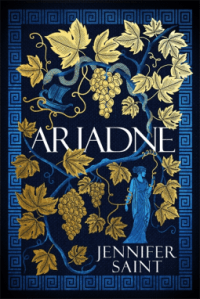 There have been several novels published recently retelling Greek myths from a feminine perspective; this is another – and one that I really enjoyed. As the title suggests, it’s the story of Ariadne, the daughter of King Minos and Queen Pasiphaë of Crete, but it’s also the story of another woman, her younger sister Phaedra.
There have been several novels published recently retelling Greek myths from a feminine perspective; this is another – and one that I really enjoyed. As the title suggests, it’s the story of Ariadne, the daughter of King Minos and Queen Pasiphaë of Crete, but it’s also the story of another woman, her younger sister Phaedra.
As two princesses of Crete, Ariadne and Phaedra grow up in the comfort of the palace at Knossos, but their brother Asterion is not so lucky. Born half man and half bull, he has become known as the Minotaur and banished to the underground labyrinth designed by Daedalus. Each year fourteen young men and women arrive from Athens to be sacrificed to the Minotaur – until the year when Theseus, Prince of Athens, is one of the fourteen and Ariadne falls in love. Swept away by the prince’s good looks and courage, Ariadne decides to help him kill the Minotaur and escape from the labyrinth, but this means betraying her family and the people of Crete.
If you have any knowledge of Greek mythology, you probably already know all of this, but I think Ariadne’s adventures after she is forced to flee Crete with Theseus are less well known, so I won’t go into too much detail here. The Minotaur story only occupies the first few chapters of the novel, with much more time spent describing what happens after that, and it was fascinating to read about Ariadne’s relationship with the god Dionysus on the island of Naxos, as well as the fate of Phaedra, left behind to deal with the aftermath of her sister’s betrayal.
Jennifer Saint has a lot to say in this novel about heroes and hero worship, particularly in her depiction of Theseus (very much the villain of the book and certainly not the Theseus we meet in Mary Renault’s The King Must Die) and of the cult of Dionysus and his female followers, the maenads. She touches on why people feel the need to put their faith in heroes and what happens when their eyes are opened to the truth, as well as exploring the differences between mortals and gods, the position of women in Ancient Greek society and how, in Greek mythology, the gods usually make the women pay the price for the acts of men.
When I first began to read, I hadn’t expected part of the novel to be written from Phaedra’s perspective, but I think using her as a viewpoint character as well as Ariadne adds more scope to the story and makes it even more interesting than it would otherwise have been. However, I thought Phaedra’s storyline suffered near the end from the weak characterisation of Hippolytus, who plays such an important role in her later life. The conclusion of Ariadne’s story is slightly disappointing too; it felt rushed and didn’t have quite the impact it should have had. Still, I enjoyed this book, particularly the first half, and I think it compares well to Circe by Madeline Miller.
Thanks to Headline for providing a copy of this book for review via NetGalley.
Might have to try this!
I would definitely recommend it if you enjoy Greek mythology!
This is going on my list too, thanks!
I hope you enjoy it as much as I did!
Oooooh….. Not sure I’ve seen this one before. I’ll add it to my ‘interest’ list. I do LOVE me some Greek myth!
If you’re interested in Greek myth I’m sure you’ll enjoy this book!
Great review! I haven’t been in a rush to get to this one because I feel a bit Greek mythologied out, but you definitely have me interested in giving this one a try.
I know what you mean about being Greek mythologied out – there have been a lot of similar books published recently! This is a really good one, though, and I definitely recommend it.
Do you think you need to know something of the myth in order to fully appreciate this book?
No, I don’t think so. I knew parts of the myth but was completely unfamiliar with some of it.
Good to know, i shall add to my wishlist in that case
Mary Renault has a trilogy about Theseus that inclines part of this story about Ariadne.
Yes, I have read The King Must Die and The Bull From the Sea. Mary Renault’s portrayal of Theseus was much more positive than this book!
I guess that’s not too surprising.
I mean “includes.”
I already wanted to read this and now even more. Hope it comes out soon in Belgium!
I hope you don’t have to wait too long. I really enjoyed it!